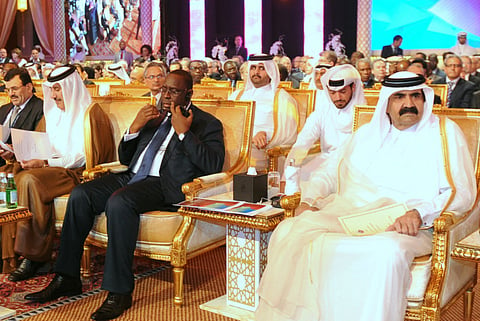Qatar Emir says change should be gradual
Democracy is more than casting ballots at specific times

Manama: Change has to be introduced gradually and through reform and dialogue in order to achieve success, Qatar’s Emir has said.
“It is most useful and safest to achieve change gradually through reform and dialogue,” Shaikh Hamad Bin Khalifa Al Thani said. “Gradual steps towards peaceful change accompanied by a clear objective are less risky and more reliable, especially in countries with multiple communities. I am confident that whoever rejects reforms and changes and cannot absorb new facts and modern requirements will be changed by the needs of history and the passage of time, for people do not live on slogans and do not confine themselves to ideologies,” Shaikh Hamad said as he opened the Doha Forum and Enriching the Middle East’s Economic Future Conference in Doha on Monday.
The Emir who has been at the helm of Qatar since 1995 said that he has repeatedly stressed the significance of gradual change “not as a means to brag about what we have achieved in a cautiously gradual way in Qatar, but to prove that what we had done was required in the current stage of history”.
The Emir said that the Arab world has been deeply influenced by the political, economic, social and intellectual changes.
“This is a highly critical stage in the history of the Arab world,” he said. “We see how people are calling for comprehensive changes and how they are striving to achieve them through various means, particularly through political participation in public affairs.”
Widespread poverty, unemployment, abuse of human rights and the inability to live in dignity under autocratic, repressive and corrupt political regimes have been the driving force behind Arab revolutions that still aim to achieve participation in making political and economic decisions, Shaikh Hamad said.
“However, achieving this objective requires developing the institutions that guarantee the quality of this participation. It cannot succeed if it is not accompanied by plans to raise awareness about democracy and by effective efforts to achieve sustainable development based on an advanced education system. This way, we make sure there are different opinions and the social interaction will be based on dialogue rather than on violence,” he said.
Shaikh Hamad said that security and stability at that stage can be consolidated nationally.
“There will then be a general conviction that the interest of the community is a common denominator, which in turn is reflected in the development of democratic practices because it will not be just casting ballots in boxes at specific times. In this regard, I would like to stress that Islam, our religion, supports the principles of consultations and justice in parallel to democracy,” he said.
Sign up for the Daily Briefing
Get the latest news and updates straight to your inbox



